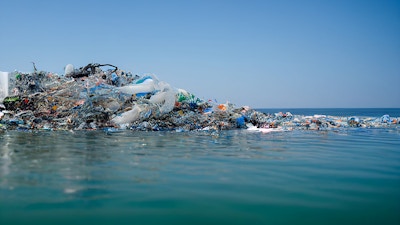Researchers Vaskar Gnyawali and Sukanya Punthambaker are uniting their disparate areas of expertise to solve the global problem of plastic pollution

It all started with an art exhibition. A few years ago, artist Lynn Hershman Leeson approached the Wyss Institute about collaborating to create a piece for her upcoming exhibit Twisted. The vision included the Wyss’ AquaPulse system purging microbes from water and a second, yet-to-be-created system that would use microbes to purge plastic from water. Among the team assembled to develop the plastic-degrading microbes under the direction of former Staff Engineer Richard Novak was postdoctoral fellow Vaskar Gnyawali, Ph.D., in the lab of Founding Director Donald Ingber, M.D., Ph.D.
The resulting artwork was displayed at the Gwangju Biennial in South Korea and at the New Museum in New York in 2021. Gnyawali remembers, “We loved working on the exhibition, but during the process, we discovered that we could isolate microbes that have evolved to break down plastic. When we thought of the potential impact on global plastic waste management, we knew we had to pursue the idea further.”
That idea has now evolved into a second-year Wyss Validation Project that uses genetically engineered microbes to degrade plastic, with the goal of using them to clean up the more than 360 million tons of plastic waste that’s generated globally every year.
Driving it toward commercialization is a dynamic duo that shares a passion for the planet and positive impact.
Entrepreneurs solving a global problem
Gnyawali and the rest of Novak’s team knew that to engineer microbes, they needed a geneticist. Given the collaborative structure of the Wyss Institute, they had many options within arm’s reach in the Synthetic Biology Platform led by Core Faculty member George Church, Ph.D. Multiple people suggested postdoctoral fellow Sukanya Punthambaker, Ph.D., who had a history of working with multidisciplinary teams to develop new ways to sequence organisms’ genetic codes.
While Gnyawali and Punthambaker had not collaborated in the lab before, they weren’t strangers: they both served on the governing board of the HMS Postdoc Association’s Entrepreneurship Committee. Together, they had successfully organized multiple educational programs for postdocs, such as a mini-MBA series that covered topics including licensing IP, identifying target markets, and spinning technologies out of academia.
At the Wyss, we’re looking for tough problems to solve, and this is one of them. It’s high risk, but when you find a solution that works, it can be high reward.

Gnyawali and Punthambaker found further common ground in their enthusiasm for solving a pervasive problem that shows no signs of stopping: the amount of plastic pollution is expected to double by 2040.
Punthambaker says, “There has to be an intervention!” Gnyawali adds, “As a member of society, I play a part in generating plastic waste. This is one way I can correct that. If this project makes even a small positive impact on the health of people and our planet, then that will be a big success.” And they are poised for big success.
Working better together
Now that Gnyawali and Punthambaker have joined forces, it’s clear they make a great team at the bench, too. They are always willing to brainstorm new ideas, listen to each other, and come up with a plan they both agree on.
We’re excited to use our complementary skill sets to tackle a huge global issue like sustainability. The Wyss’ translational approach to science will help us have a direct impact on society.
Their complementary skill sets are also a great asset to their commercialization plans. Gnyawali’s multifaceted technical background in computer, microsystems, and mechanical engineering enables him to set up, analyze, and iterate complex experiments. Punthambaker, who has a history of dance and vocal performance in addition to genetics, is a gifted communicator, and handles business development with potential partners and investors.

